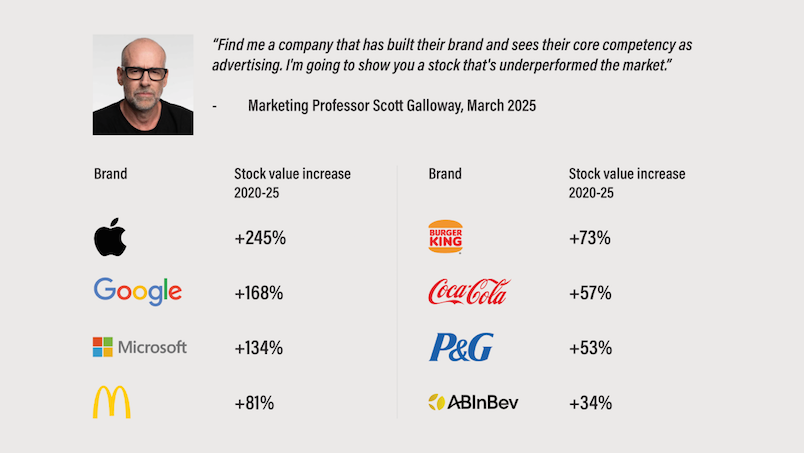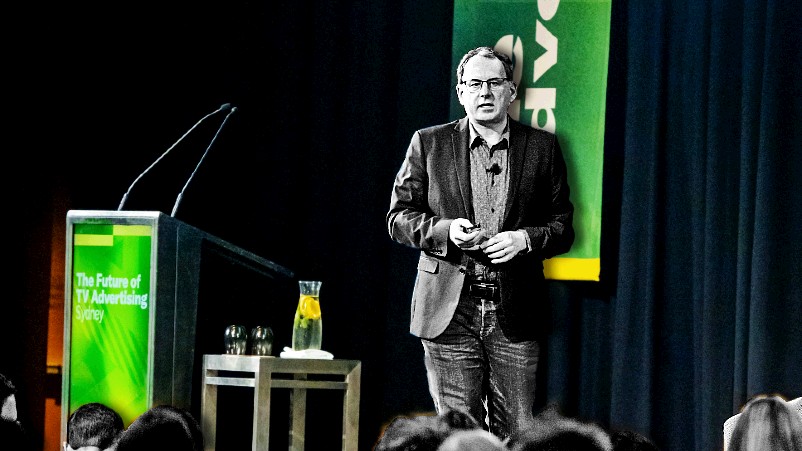James Hurman vs Scott Galloway on brand, advertising and why the world's biggest firms that 'don't get it'... probably do get it

Same t-shirt, different brand lenses: James Hurman (left) and Scott Galloway.
After taking on Professor Byron Sharp, advertising effectiveness veteran James Hurman has delivered a robust counter to Professor Scott Galloway's assertions that the world's biggest and fastest growing companies "don't advertise" and that those which do advertise "don't get it". He's brought the receipts.
Awkward customer
Advertising effectiveness veteran James Hurman is awaiting a response from Professor Scott Galloway after delivering a clinical counter to some of the professor’s broadsides against brand and advertising – while simultaneously creating a piece of effective B2B content marketing.
Hurman has form in trading views with marketing professors – pushing back against Ehrenberg-Bass Institute Director Byron Sharp's claims that marketers adhering to Binet & Field's 60:40 brand to performance heuristic risked making investment decisions based on questionable data, and that those paying more for extra attention risked being "suckered".
Hurman is also the program director for the Master of Advertising Effectiveness course, which he runs in association with Warc. He therefore has both a philosophical and professional interest in rebutting claims that advertising is essentially a waste of money.
A podcaster, author, conference speaker and clinical professor of marketing at NYU’s Stern School of Business, Galloway strongly suggests advertising has become less relevant.
Hurman strongly disagrees, taking aim at Galloway’s view that big companies don’t bother spending much on advertising – and that those that do are underperforming the market. (There’s some nuance to his phrasing, but that’s the gist.)
“What the companies that have added over $100 billion in value in the last decade have in common is they don't advertise … I think advertising outs you as not getting it,” per Galloway, speaking on System1 CMO Jon Evans’ Uncensored CMO podcast in 2024.
Galloway said the same thing at ADMA’s Global Forum in 2023, (Mi3 questioned that statement at the time, but Hurman is more thorough and shows his data sources here). Galloway reiterated that view on his latest Uncensored podcast interview, though a slightly caveated version. Hurman takes issue with the general premise.
“Let's look at the data, and let's start with the companies that have added $100 billion in enterprise value over the past couple of decades.
“That's a massive amount of value. So there aren't many companies who have achieved it, but some have, and those companies are: Apple, Microsoft, Amazon, Netflix, Alphabet, Meta, Tesla, Nvidia, OpenAI, Tencent, Alibaba, Bytedance, T Mobile and Eli Lilly. For comparison, any company that spends over a billion dollars annually on advertising is a huge advertiser, in the top twentieth of a per cent of all advertisers,” said Hurman.
He then compared those big advertisers to those firms that have added $100bn of value over the past two decades:
“Apple spends about $7 billion a year on advertising. Microsoft spends about $5 billion. Amazon is the biggest advertiser in the world, spending more than $20 billion a year. Alphabet spends around $9 billion; Meta about $2 billion; Alibaba, about $10 billion; Bytedance, $19 billion; T Mobile, about $2 billion, and Eli Lilly and Netflix, about $1.5 billion each.”

Source: James Hurman, Previously Unavailable
Hurman points out that while Nvidia hasn’t had to advertise given huge demand for its chips, it does spend about $100m a year on ads, while OpenAI this year ran a Super Bowl ad, and Tesla has started to advertise (and may have to do a lot more given earnings challenges).
The rest? “They are among the biggest advertisers in the world, and are commonly seen in traditional media environments like television and outdoor,” per Hurman. “So if advertising ‘outs you as not getting it’, then Apple, Google, Tiktok, Nvidia, OpenAI don't get it. Which makes me wonder, who does get? Maybe it's Amazon, the world's biggest advertiser.”
Stock response
Hurman likewise deconstructs Prof Galloway’s suggestion that firms reliant on advertising are behind the growth curve: “Find me a company that has built their brand and sees their core competency as advertising, I'll show you a stock that's underperforming the market.”
There’s caveats to that statement too – given seven big tech firms have driven the vast majority of US stock market growth in recent years. Nonetheless, Hurman takes it on.
He warned that, versus the ‘magnificent seven’ tech outliers, for most ‘normal’ companies, “what we know from all the evidence is that if you shift your spend away from brand building advertising, your growth and profitability will suffer”.

Source, James Hurman, Previously Unavailable
Boutique beatdown
Hurman likewise takes issue with Galloway extrapolating his personal views and choices to the broader market – for example, why he choses boutique hotels like Hotel du Cap in Antibes over big brand chains: “I don't need to defer to the brand anymore. The reality is, technology has basically obviated the need for [brand] shorthand.”
(In Galloway’s view Google disrupted the need for broadcast advertising, democratised choice and removed the rationale for building brand in order to sell an often inferior product for a large mark-up to people who didn’t know better.)
“Has the rise of Google, then TripAdvisor, then AI, really obviated the need for shorthand and resulted in people turning away from big hotel brands and towards those lesser known brands that might have a better product?” asks Hurman.
He turns to the market share growth of Hilton and Marriott. Both have more than doubled marketshare since the emergence of Google around the turn of the millennium, and both have increased profit and revenue in the last decade (though Marriott is doing markedly better).
“What that tells us is that even if Scott is indeed booking a Hotel Du Cap, most other people are booking brands they know, like Marriott and Hilton, and those brands are growing, which suggests more people are doing that, not less,” argues Hurman.
“It's very unscientific to look at what's happening in our own lives and in our small circle, extrapolate that out and expect that to be the pattern that holds true across the whole market.”
Non-binary choice
Hurman doesn’t disagree with Galloway’s broader view that experience and product drive growth – and recently aired evidence that customer experience can move the dial more in driving positive consumer sentiment and “emotional loyalty” than advertising. But his argument is that none of those elements are mutually exclusive.
“One of the biggest things that I've learned in both studying marketing and also studying and investing in companies is that high performing companies are not good at one thing. They're good at everything,” says Hurman, i.e. great product, great experience and great brand working in tandem equals higher growth.
“I like so much of what Scott has to say. He's really great. But when it comes to marketing, brand building and advertising, the sensational stuff that he says just doesn't hold water. In most cases, it's obviously and very provably wrong,” adds Hurman.
“My advice? Love Scott for the entertainment, and for his often very wise and very thoughtful perspectives on societal issues. But take what he says about marketing with a grain of salt and pay attention to real evidence-based advice on how advertising works and how brands are built.”
Hurman told Mi3 that Galloway has not responded to his counterpoints – and couldn’t yet confirm whether his evidence-based counterarguments had driven both brand and future demand: “I don't know the uplift from that post, but I'll ask the team in the next sales review.”







